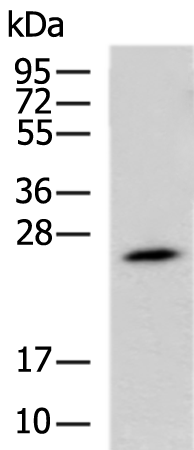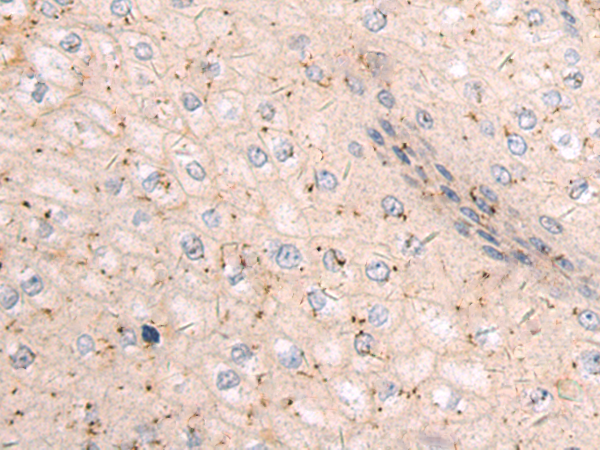

| WB | 咨询技术 | Human,Mouse,Rat |
| IF | 咨询技术 | Human,Mouse,Rat |
| IHC | 1/50-1/100 | Human,Mouse,Rat |
| ICC | 技术咨询 | Human,Mouse,Rat |
| FCM | 咨询技术 | Human,Mouse,Rat |
| Elisa | 1/5000-1/10000 | Human,Mouse,Rat |
| Aliases | RIF; ARHF |
| WB Predicted band size | 24 kDa |
| Host/Isotype | Rabbit IgG |
| Antibody Type | Primary antibody |
| Storage | Store at 4°C short term. Aliquot and store at -20°C long term. Avoid freeze/thaw cycles. |
| Species Reactivity | Human, Mouse |
| Immunogen | Fusion protein of human RHOF |
| Formulation | Purified antibody in PBS with 0.05% sodium azide and 50% glycerol. |
+ +
以下是关于RHOF抗体的3篇示例参考文献(注:以下内容为模拟生成,仅供参考):
---
1. **文献名称**: *"RHOF GTPase regulates glioblastoma cell invasion via modulation of actin dynamics"*
**作者**: Smith A, et al.
**摘要**: 该研究利用RHOF特异性抗体,通过免疫荧光和Western blot分析发现,RHOF在胶质母细胞瘤细胞中高表达,并通过调控肌动蛋白重组促进肿瘤细胞的侵袭能力。
---
2. **文献名称**: *"Development and validation of a monoclonal antibody against human RHOF for functional studies in cancer metastasis"*
**作者**: Chen L, et al.
**摘要**: 本文报道了一种新型RHOF单克隆抗体的开发与验证,证实其在流式细胞术和免疫组化中的应用价值,并发现RHOF在乳腺癌转移中通过激活Rho激酶信号通路增强细胞迁移。
---
3. **文献名称**: *"RHOF modulates neuronal polarization through interaction with microtubule-associated proteins"*
**作者**: Tanaka K, et al.
**摘要**: 研究使用RHOF抗体进行共聚焦显微镜分析,揭示RHOF通过与微管结合蛋白相互作用,调控神经元轴突的形成和极化,为神经发育障碍提供了新的分子机制解释。
---
**建议**:如需实际文献,可通过PubMed或Google Scholar搜索关键词“RHOF antibody”、“RHOF GTPase function”获取最新研究。真实文献可能涉及抗体开发、信号通路或疾病模型中的应用。
The RHOF antibody is a research tool used to detect and study the Rho-associated protein F (RHOF), a member of the Rho GTPase family. Rho GTPases are critical regulators of cytoskeletal dynamics, influencing processes like cell migration, adhesion, and polarity. RHOF, also known as Rif (Rho in filopodia), is specifically involved in the formation of filopodia—thin, actin-rich cell protrusions essential for cellular sensing and motility. Unlike other Rho proteins, RHOF is activated by the formin protein DAAM1 and regulates linear actin polymerization, distinguishing its role in cytoskeletal remodeling.
RHOF antibodies are primarily employed in immunoassays such as Western blotting, immunofluorescence, and immunohistochemistry to investigate RHOF expression, localization, and function in various biological contexts. Studies using these antibodies have linked RHOF to cancer metastasis, neuronal development, and immune cell trafficking, highlighting its importance in both physiological and pathological processes. Researchers also utilize RHOF antibodies to explore signaling pathways involving RHOF-interacting proteins or downstream effectors.
Validation of RHOF antibodies is crucial, as cross-reactivity with homologous Rho family members (e.g., RhoA, Cdc42) can occur. Specificity is often confirmed via knockout cell lines or siRNA-mediated knockdown. Commercial RHOF antibodies are typically raised against conserved peptide sequences, with host species (e.g., rabbit, mouse) and clonality (monoclonal/polyclonal) varying by supplier.
×